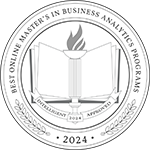Online Master of Science in Applied Business Analytics Degree
According to a recent report by McKinsey, data needs to be treated as one of the products produced within the organization rather than as a raw material that supports decisions. As data-driven business models change the face of industry, developing the ability to capitalize upon this valuable resource is compulsory.
In a recent analysis, PwC determined that 67 percent of job openings requiring data science and analytics competencies are for “analytics-enabled” roles, such as chief executive officer, chief data officer, director of IT, human resources manager, financial manager, and marketing manager. While the jobs are there, there is a shortage of analytics-enabled personnel who combine expertise in their industry with the ability to understand and leverage big data to engage in predictive analytics or make data-informed business decisions.
To help close this skills gap, Boston University’s Metropolitan College offers an online Master of Science in Applied Business Analytics Management degree program. Students have the opportunity to gain hands-on experience with a variety of analytical models and decision-support tools, which they can apply to interlinked data-inputs and large data sets in the areas of marketing, operations, product and technology innovations, financial services, and others. Boston University’s applied business analytics curriculum covers advanced software tools and functions, such as descriptive, predictive, and prescriptive modeling; text and data mining; visual analytics; and business simulations. Graduates of the program will be able to analyze data-driven business processes, select appropriate analytical methods to monitor and identify performance issues, prescribe possible outcomes, and propose optimal data-based solutions.
Students who complete the master’s degree in Applied Business Analytics will be able to demonstrate:
- The knowledge and skills necessary to better utilize available information in operational, tactical, and strategic decision-making in organizations.
- Experience with various powerful emerging technologies and techniques for increasing the value of both in-house and third-party data sets.
- An understanding of how organizations are using interlinked data-inputs, analytics models, and decision-support tools to better understand their operations, customers, and markets.
- Expertise in web analytics and metrics, and the ability to procure and process unstructured text, and delve into hidden patterns within data sets.
- The ability to facilitate knowledge discovery using data-mining and visualization techniques over vast amounts of data.
Awards & Accreditations
 Accredited member of AACSB International―The Association to Advance Collegiate Schools of Business (through BU’s Questrom School of Business)
Accredited member of AACSB International―The Association to Advance Collegiate Schools of Business (through BU’s Questrom School of Business)
 Newsweek magazine ranked Boston University’s online programs #4 in the nation in its 2023 survey.
Newsweek magazine ranked Boston University’s online programs #4 in the nation in its 2023 survey.
Why Choose BU’s Master of Science in Applied Business Analytics?
- The Applied Business Analytics program offers the flexibility of online or on-campus study formats, ensuring that students can earn their degree the way that suits them the best.
 In 2025, Metropolitan College’s online master’s degrees in management were ranked #10 among the Best Online Master's in Business Programs (Excluding MBA) by U.S. News & World Report.
In 2025, Metropolitan College’s online master’s degrees in management were ranked #10 among the Best Online Master's in Business Programs (Excluding MBA) by U.S. News & World Report. BU MET’s MS in Applied Business Analytics is ranked #2 (and Best in Northeast) Best Online Master’s in Business Analytics Degree Programs for 2024 by Intelligent.com.
BU MET’s MS in Applied Business Analytics is ranked #2 (and Best in Northeast) Best Online Master’s in Business Analytics Degree Programs for 2024 by Intelligent.com.- Through Boston University’s Questrom School of Business, BU MET is an accredited member of AACSB International―The Association to Advance Collegiate Schools of Business.
- Learning from expert faculty from MET’s Department of Administrative Sciences, students benefit from our unique combination of dynamic academic curriculum, the latest educational technologies, flexible delivery modes, advanced pedagogy, and professional contacts within the business analytics industry.
Meet Dr. Vladimir Zlatev, one of the faculty members you’ll work with in the Applied Business Analytics program.
Career Outlook
Management Analysts
10% increase in jobs through 2032
$95,290 median annual pay in 2022
Financial Analysts
8% increase in jobs through 2032
$96,220 median annual pay in 2022
Market Research Analysts
13% increase in jobs through 2032
$68,230 median annual pay in 2022
Mathematicians and Statisticians
30% increase in jobs through 2032
$99,960 median annual pay in 2022
Operations Research Analysts
23% increase in jobs through 2032
$85,720 median annual pay in 2022
Bureau of Labor Statistics, U.S. Department of Labor, Occupational Outlook Handbook, at https://www.bls.gov/ooh/math/home.htm (visited September 06, 2023).
Employment for management analysts is projected to grow 10% from 2022-2032, much faster than average for all occupations.
Bureau of Labor Statistics
Tuition & Financial Assistance
Money Matters
Boston University Metropolitan College (MET) offers competitive tuition rates that meet the needs of part-time students seeking an affordable education. These rates are substantially lower than those of the traditional, full-time residential programs yet provide access to the same high-quality BU education. To learn more about current tuition rates, visit the MET website.
Financial Assistance
Comprehensive financial assistance services are available at MET, including scholarships, graduate loans, and payment plans. There is no cost to apply for financial assistance, and you may qualify for a student loan regardless of your income. Learn more.
Curriculum
A total of 32 units is required.
Students must complete the core courses, elective courses, and general elective as indicated.* Students who already hold the Graduate Certificate in Applied Business Analytics may waive the four specialization courses.
*Degree requirements may vary for those students transferring credits from previous coursework at Boston University or receiving course waivers due to professional designations.
Courses
As a prerequisite to the course MET AD 571 Business Analytics Foundations, students are required to complete MET AD 100 Pre-Analytics Laboratory and MET ADR 100 Introduction to R for Business. Some courses may have additional prerequisites.
Degree Core Courses
(Four courses/16 credits)
METAD571 Business Analytics Foundations
Prerequisite: AD100 Pre-Analytics Laboratory
This course presents fundamental knowledge and skills for applying business analytics to managerial decision-making in corporate environments. Topics include descriptive analytics (techniques for categorizing, characterizing, consolidating, and classifying data for conversion into useful information for the purposes of understanding and analyzing business performance), predictive analytics (techniques for detection of hidden patterns in large quantities of data to segment and group data into coherent sets in order to predict behavior and trends), prescriptive analytics (techniques for identification of best alternatives for maximizing or minimizing business objectives). Students will learn how to use data effectively to drive rapid, precise, and profitable analytics-based decisions. The framework of using interlinked data inputs, analytics models, and decision-support tools will be applied within a proprietary business analytics shell and demonstrated with examples from different functional areas of the enterprise. R, SQL, and Power BI software are used in this course. [4 credits]
METAD599 Python and SQL for Business Analytics
Prerequisites: AD100 - Python is a modern, high-level programming language. One of the most popular programming languages, its use has steadily increased across a large number of industries. This course introduces students to the Python environment and teaches a solid foundation in the basic syntax and structure. Structured Query Language (SQL) is the most common language globally for interacting with relational databases. Employers have indicated that knowledge of SQL is one of the most important skills for new graduates entering the workforce. Even with advances in database technologies and languages for handling heterogeneous data types, SQL remains the core skill for interacting with data. This course introduces both languages to equip students pursuing an analytics education with the skills necessary to succeed in the analytics and data visualization field. The outcome of this course will be a focused survey of Python and SQL topics designed to equip analytics professionals rather than a deep focus on technical programming topics. [4 credits]
METAD632 Financial Concepts
Introduction to the concepts, methods and problems of accounting and financial analysis. Includes accounting principles, measurement and disclosure issues, financial statement analysis, time value of money, cash flow projection and analysis, capital budgeting and project evaluation, bond and equity valuation, cost of capital and capital structure. 4 cr. Effective Fall 2021, this course fulfills a single unit in each of the following BU Hub areas: Quantitative Reasoning II, Critical Thinking. [4 credits]
METAD715 Quantitative and Qualitative Decision-Making
The purpose of this course is to help improve business problem solving and managerial decision-making through the use of quantitative and qualitative decision-making tools and techniques. This course will provide the student with an overview of how decisions are made to solve management problems in the business environment. It introduces the fundamental concepts and methodologies of the decision-making process, problem-solving, decision analysis, data collection, probability distribution, evaluation, and prediction methods. Students will learn how to apply different quantitative and qualitative analytical tools commonly used in business to provide a depth of understanding and support to various decision-making activities within each subject area of management. Through the use of case studies of decisions made by managers in various production and service industries and a business simulation package specifically prepared for this course, the scope and breadth of decision-making in business will be described. [4 credits]
Specialization Courses
(Three courses/12 credits)
METAD616 Enterprise Risk Analytics
Prerequisite: MET AD 571. - The course offers an overview of the key current and emerging enterprise risk analytical approaches used by corporations and governmental institutions and is focused on understanding and implementing the enterprise risk management framework on how to leverage the opportunities around a firm to increase firm value. The major risk categories of the enterprise risk management such as financial risk, strategic risk, and operational risk will be discussed and risk analytics approaches for each of these risks will be covered. Students will learn how to use interlinked data inputs, analytics models, business statistics, optimization techniques, simulation, and decision-support tools. An integrated enterprise risk analytics approach will be demonstrated with examples from different functional areas of the enterprise. Python, R, SQL, and Power BI software are used in this course. [4 credits]
METAD654 Marketing Analytics
Prereq: METAD571
Become familiar with the foundations of modern marketing analytics and develop your ability to select, apply, and interpret readily available data on customer purchase behavior, new customer acquisition, current customer retention, and marketing mix optimization. This course explores approaches and techniques to support the managerial decision-making process and skills in using state-of-the- art statistical and analytics tools. Students will have an opportunity to gain a basic understanding of how transaction and descriptive data are used to construct customer segmentation schemas, build and calibrate predictive models, and quantify the incremental impact of specific marketing actions. Python, R, SQL, and Power BI software are used in this course. [4 credits]
METAD688 Cloud Analytics for Business
Prerequisites: AD571. - Explore web analytics, text mining, web mining, and practical application domains. The web analytics part of the course studies the metrics of websites, their content, user behavior, and reporting. The Google Analytics tool is used for the collection of website data and doing the analysis. The text mining module covers the analysis of text including content extraction, string matching, clustering, classification, and recommendation systems. The web mining module presents how web crawlers process and index the content of websites, how search works, and how results are ranked. Application areas mining the social web and game metrics will be extensively investigated. R, SQL, and Power BI software are used in this course. [4 credits]
METAD698 Applied Generative AI for Business Analytics
Prerequisite: MET AD571
Generative AI is transforming industries by automating tasks, generating content, and assisting in decision-making. This hands-on course explores how business professionals, analysts, and managers can apply Generative AI to solve real-world business challenges. The course emphasizes practical AI applications, covering topics like prompt engineering, AI-driven workflow automation, AI-powered data analytics, and responsible AI practices. Students will gain experience using Jupyter Notebooks, VS Code, SQL, and GitHub to integrate AI into their workflows. [4 credits]
METAD699 Data Mining for Business Analytics
Prerequisites: AD571
Enterprises, organizations, and individuals are creating, collecting, and using a massive amount of structured and unstructured data with the goal of converting the information into knowledge, improving the quality and the efficiency of their decision-making process, and better positioning themselves in the highly competitive marketplace. Data mining is the process of finding, extracting, visualizing, and reporting useful information and insights from both small and large datasets with the help of sophisticated data analysis methods. It is part of business analytics, which refers to the process of leveraging different forms of analytical techniques to achieve desired business outcomes through requiring business relevancy, actionable insight, performance management, and value management. The students in this course will study the fundamental principles and techniques of data mining. They will learn how to apply advanced models and software applications for data mining. Finally, students will learn how to examine the overall business process of an organization or a project with the goal of understanding (i) the business context where hidden internal and external value is to be identified and captured, and (ii) exactly what the selected data mining method does. Python, R, SQL, and Power BI software are used in this course. [4 credits]
METAD799 Deep Learning for Business Analytics
Prerequisites: MET AD 599 and MET AD 571. - This course focuses on applying deep learning techniques to solve practical problems in business analytics. Students will explore foundational concepts of deep learning, including MLPs (Multi-Layer Perceptrons), Convolutional Neural Networks (CNNs), Recurrent Neural Networks (RNNs), and advanced architectures like Generative Adversarial Networks (GANs), Graph Neural Networks (GNNs), and Transformers. Through lectures, hands-on projects, and real-world datasets, students will develop the skills to design, train, and optimize deep learning models to extract insights and drive decision-making in business contexts. [4 credits]
METAD899 Capstone Project in Applied Business Analytics
Prerequisites: at least three of the ABA elective courses
The Business Analytics Capstone Project provides valuable learning experiences and opportunities to apply a set of techniques, competencies, and procedures acquired after the completion of all core and specialization courses within the MS in Applied Business Analytics program. The purpose of this course is to obtain insights about a business that results in improved data-driven decision- making to create value on different levels of an enterprise. Includes application of statistical, stochastic, and dynamic modeling, data mining, forecasting, and operations research techniques to the analysis of problems of business organization and performance. R, Python, SQL, and Power BI software are used in this course. The solving of real problems facing different size companies are assigned to small teams of students and is overseen by our curriculum advisory board, ABA faculty, and business partners from a range of industries. [4 credits]
Elective Courses
(One course/4 credits)
One elective in the area of management or data science chosen with the advice and approval of an academic advisor.

Vladimir Zlatev
Associate Professor of the Practice of Administrative Sciences
PhD, MS, BS, Dresden University of Technology

Christopher Athaide
Assistant Professor, Administrative Sciences
PhD, Massachusetts Institute of Technology
MS, Rensselaer Polytechnic Institute
BTech, Indian Institute of Technology, Mumbai

Krystie Dickson
Lecturer, Administrative Sciences
MS, Boston University
MS, The Arthur Lok Jack Global School of Business, University of the West Indies
BS, University of the West Indies

Nakul Padalkar
Associate Professor of the Practice, Administrative Sciences
PhD, MS, Texas Tech University
MS, Pittsburg State University
BE, Pune University

Gregory Page
Lecturer
MBA, Massachusetts Institute of Technology
MEd, Harvard University
BA, Stanford University

Michael Parzen
Associate Professor of the Practice, Administrative Sciences
DSc, Harvard University
MS, Brown University
MS, BS, Carnegie Mellon University
View all Faculty

David Ritt
Lecturer, Administrative Sciences
MS, Boston University
BA, University of Chicago

Sree Kumar Valath Bhuan Das
Lecturer, Administrative Sciences
MS, Boston University
BTech, Jain University
Ted Chan
Lecturer, Administrative Sciences
CEO, Guide-a-Guest
MBA, Massachusetts Institute of Technology
Josephine Ma
Lecturer, Administrative Sciences
Senior Quantitative Risk Analyst, State Street
MS, Boston University
Judah Phillips
Lecturer, Administrative Sciences
Chief AI and Product Officer, Market Holdings LLC; CEO, Squark
MS, Northeastern University

Roman Rabinovich
Lecturer, Administrative Sciences
Data Strategy Partner, Decile
PhD, Grenoble School of Management, France; MS, Boston University; BA, Pace University
Patrick Tyson
Lecturer, Administrative Sciences
Data Scientist, Prime Therapeutics
MS, Boston University; BA, University of Minnesota–Twin Cities
Getting Started
To learn more or to contact an enrollment advisor before you get started, request information using the button below and tell us a little about yourself. Someone will be in touch to answer any questions you may have about the program and detail the next steps in earning your degree. You can also start your application or register for a course at Metropolitan College.
 Accredited member of AACSB International―The Association to Advance Collegiate Schools of Business (through BU’s Questrom School of Business)
Accredited member of AACSB International―The Association to Advance Collegiate Schools of Business (through BU’s Questrom School of Business) Newsweek magazine ranked Boston University’s online programs #4 in the nation in its 2023 survey.
Newsweek magazine ranked Boston University’s online programs #4 in the nation in its 2023 survey. In 2025, Metropolitan College’s online master’s degrees in management were ranked #10 among the Best Online Master's in Business Programs (Excluding MBA) by U.S. News & World Report.
In 2025, Metropolitan College’s online master’s degrees in management were ranked #10 among the Best Online Master's in Business Programs (Excluding MBA) by U.S. News & World Report. BU MET’s MS in Applied Business Analytics is ranked #2 (and Best in Northeast) Best Online Master’s in Business Analytics Degree Programs for 2024 by Intelligent.com.
BU MET’s MS in Applied Business Analytics is ranked #2 (and Best in Northeast) Best Online Master’s in Business Analytics Degree Programs for 2024 by Intelligent.com.








